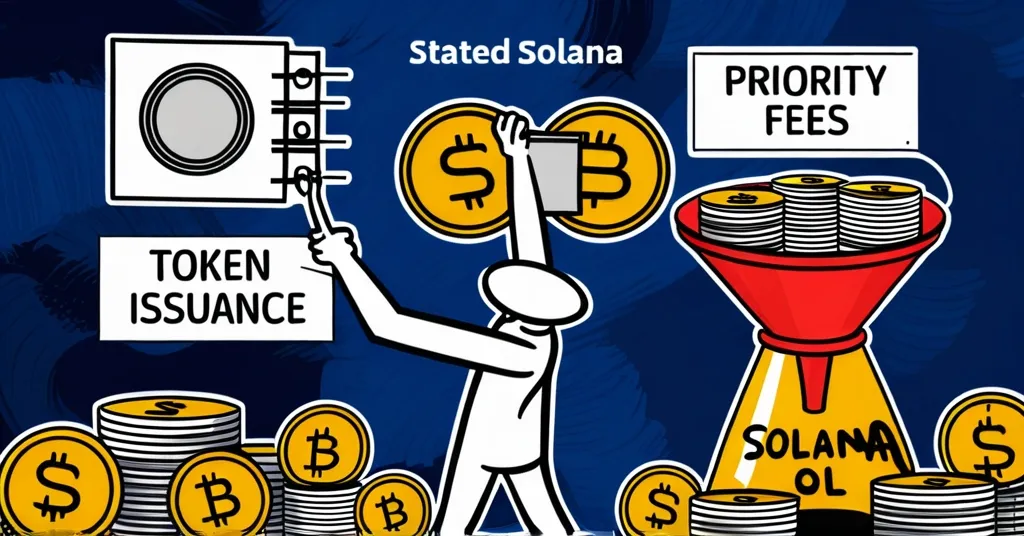Solana Proposes New Strategies to Combat Inflation and Enhance Security

Solana’s New Proposals Aim to Tackle Inflation and Boost Network Security
Solana is taking significant steps to refine its ecosystem with proposals designed to manage inflation and enhance network security. These changes could impact your SOL holdings and the broader Solana community.
- SIMD-0228 adjusts token issuance based on staking rates.
- SIMD-0096 redirects priority fees to validators.
- Jito’s success offers an alternative validator incentive model.
Multicoin Capital’s proposal, SIMD-0228, introduces a variable emission model to curb inflation. Staking is akin to depositing money in a bank to earn interest, but in this case, you’re supporting the Solana network. If less than 50% of SOL is staked, more tokens are issued to entice more users to stake their SOL. If staking exceeds 50%, token issuance decreases to keep inflation in check. This mechanism is designed to maintain a balance, much like a thermostat adjusting to keep a room at the perfect temperature.
Meanwhile, the previously approved SIMD-0096 aims to bolster network security by redirecting priority fees to validators. Priority fees are additional payments users can make to expedite their transactions on the network. This move has sparked debate, with critics like some community members warning that it could lead to higher inflation rates, disproportionately affecting those who choose not to stake their SOL. Despite approval, SIMD-0096 remains unimplemented on the Solana mainnet, leaving room for further discussion and potential adjustments.
Amidst these discussions, Jito, a Solana-based maximal extractable value (MEV) solution, has made headlines by surpassing $100 million in tips. MEV refers to the profit a miner or validator can make by including, reordering, or excluding transactions in a block. Jito’s success underscores the potential for alternative incentive models for validators, which could influence Solana’s ongoing debate on tokenomics and help manage inflation without relying solely on token issuance.
Currently, about 65% of SOL’s circulating supply is staked, according to StakingRewards, reflecting a strong community engagement. Yet, managing this high participation rate sustainably is crucial for the network’s long-term health and growth.
The ongoing discussions around Solana’s tokenomics reflect broader industry challenges in balancing decentralization, security, and economic incentives. These proposals could set precedents for other blockchain networks facing similar issues, demonstrating the complexities involved in managing decentralized ecosystems.
Looking forward, Solana’s efforts to refine its token emission model and validator incentives underscore a commitment to building a more resilient and equitable blockchain ecosystem. Whether these proposals will successfully navigate the delicate balance of inflation and network security remains to be seen, but they mark a critical step in the maturation of the crypto space.
In the world of crypto, change is the only constant. As Solana continues to innovate and adapt, its journey offers valuable insights into the future of decentralized finance.
Key Takeaways and Questions
- What is the purpose of SIMD-0228?
To manage Solana’s inflation by adjusting token issuance based on staking participation rates.
- How does the staking participation rate affect token issuance under SIMD-0228?
If staking falls below 50%, more tokens are issued to encourage staking. If it exceeds 50%, fewer tokens are issued to curb inflation.
- What was the goal of the SIMD-0096 proposal?
To enhance network security by redirecting priority fees to validators.
- What concerns were raised about SIMD-0096?
Critics worry that redirecting priority fees could increase inflation, negatively impacting non-staking SOL holders.
- Has SIMD-0096 been implemented on the Solana mainnet?
No, it has not been implemented yet.
- What percentage of SOL’s circulating supply is currently staked?
Approximately 65%.
- What is Jito, and how has it performed?
Jito is a Solana-based MEV block-building solution that has surpassed $100 million in tips, providing additional income for validators.
- How do MEV rewards impact Solana’s tokenomics?
MEV rewards offer an alternative incentive for validators, potentially reducing the need for high token issuance and helping manage inflation.



